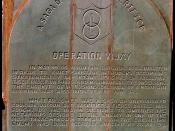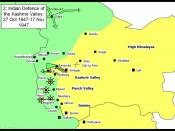When the British relinquished their control over India, the 565 independent princely states were given the option to join either of the two nations-i,e. India or Pakistan. A few princely states among them were the Mirs of Hunza, Nagar and Kalat, readily joined Pakistan, but the rest, except Hyderabad (the largest of the princely states with 132,000 square kilometers and a population of more than 14 million), Jammu and Kashmir (with 3 million inhabitants), and Junagadh (with a population of 545,000)--merged with India.The Hindu maharajah of predominantly Muslim Jammu and Kashmir remained uncommitted until armed tribesmen and regular troops from Pakistan infiltrated his domain, inducing him to sign the Instrument of Accession to India on October 27, 1947. Pakistan refused to accept the legality of the accession, and, as a result, war broke out.
Thus the first Indo-Pakistani conflict started (1947-48). The military was called upon to defend the borders of the state of Jammu and Kashmir when tribals--principally Pathans--attacked from the northwest reaches of Kashmir on October 22, 1947.
India's 161st Infantry Brigade was deployed and thwarted the advance of the tribal forces. In early November 1947, the 161st counterattacked and successfully broke through the enemy defenses. Despite early successes, the Indian army suffered a setback in December because of logistical problems. The problems enabled the forces of Azad Kashmir (Free Kashmir, as the part of Kashmir under Pakistani control is called) to take the initiative and force the Indian troops to retreat from the border areas. In the spring of 1948, the Indian side mounted another offensive to retake some of the ground that it had lost. No doubt fearing that the war might move into Pakistan proper, regular units of the Pakistani army became more actively involved. As the conflict escalated, the Indian leadership was quick...


